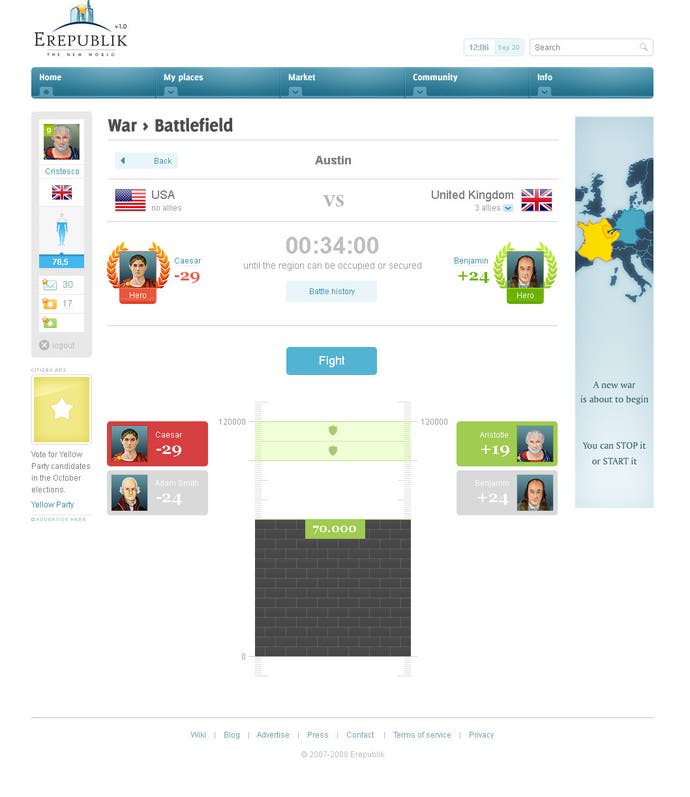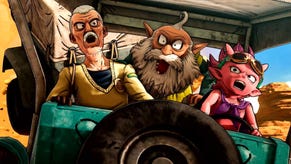eRepublik
Bite-sized democracy.
And to help new players through the initial thicket of options - newspapers to subscribe to or start up, political parties to join or form, and nations to trade with or fight - there's always the familiar crutch of fresh experience points, along with a few judicious thefts from Facebook. "We give you a to-do list, which knows what level you are and is constantly giving you tips on how to progress or things you might like to do - for example, get a job, and get some experience points, become a soldier, put some pictures in your avatar," says Bonte.
"But it comes back to the fact that the way you really start progressing is when you start interacting with others. That's why newspapers are a super-important part of the game. There are about 13,000 at the moment. The top one is a Swedish newspaper with 800 subscribers, while the top 200 have at least 200 subscribers each. You can form one or just submit articles. And there are a lot of comments on the articles already, a lot of interaction going on. And that's just one way of becoming successful. It's social strategy."
And at the moment, it seems to be working. eRepublik may initially seem slightly austere, but the clean interface holds a wealth of options, and the game is only ever as cerebral and strategic as you want it to be. At the very least, it's fascinating to spend time in a mirror world where the most populous superpowers are America and Romania, and Sweden's IKEA-like ingenuity has lead them to be the most economically successful nation on the planet - possibly through careful deployment of Allen keys and flat-pack bookshelves. The more you investigate in eRepublik, the more papers you read, jobs you try out, and politics you dabble in, the more this strangely familiar environment opens itself up to you. And while the infrastructure is nothing but HTML, the landscape that is emerging is driven purely by the choices of other, living, breathing (and largely Romanian by the looks of it) people.

But the most promising aspect is that this game isn't just about democracy: it's a product of democracy too. Bonte describes the current version of eRepublik as about twenty per cent feature-complete. "It's a constantly evolving and changing world. It needs a lot of work, but that's one of the great things about doing things online, every day you listen to what people want, and tweak it." The first thing on the horizon is a new API to allow players to make their own applications. There's a chance that the whole thing could all go a bit Scrabulous, with eRepublik's clean geopolitical lines blurring under a confusing influx of zombie and pirate requests, pokes, winks, and Naruto Fact-of-the-Day dispensers, but the carefully playful way in which the audience has behaved itself so far suggests this probably won't be the case.
At times, eRepublik seems a dangerously intelligent take on entertainment for a world which likes to watch lycra-clad celebrities trying to fit through holes in a polystyrene wall of a Saturday evening, but Bonte's player numbers are already growing steadily. The beta topped out at 35,000 active participants, and two days after the game's full launch, the figure had risen to 42,000. It helps that there's no subscription fee - eRepublik is currently funded by the entirely optional purchase of additional in-game currency, but even that is sensibly regulated to stop players from buying more than a little every day - and with such a simple sign-up process, the game is almost too interesting a prospect to ignore. So far, its designers have been clever enough to keep a growing population playing by the rules in an environment where they could easily choose to revolt and spoil everything, while as a strategy title, eRepublik has proved sufficiently subtle to explore the distinction between choosing to wield power, or opting to be quietly influential instead. And, if nothing else, the whole enterprise will at least provide Canadians with somewhere nice to hang out.
You can access eRepublic at www.erepublik.com.








